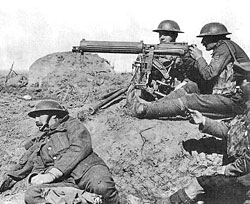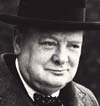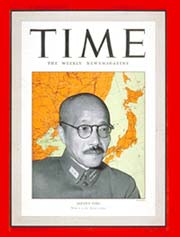Democracies Offer a Weak Response
Fascism's rise to power on the world stage was only possible because of the distractions and weaknesses suffered by the United States, Britain and France during the 1930s. The failure of the democratic powers to confront the threat made war inevitable. Yet, at the time reasonable people believed that something short of war could contain fascism.
Ongoing American Isolation
 The folly and carnage of World War I led many to believe America should avoid any foreign war. (Image courtesy Wikimedia)
The folly and carnage of World War I led many to believe America should avoid any foreign war. (Image courtesy Wikimedia) Isolationism ran deep in the currents of American politics and society in the 1930s. Most people believed the nation had plenty to deal with in its attempts to rise out of the Depression. And "revisionist" historians argued that World War I had been nothing more than a sordid scramble among imperialist powers for wealth. It was therefore in the best interest of peace and democracy that the United States avoid overseas wars. To be sure, most Americans looked on in horror at the brutality against German Jews or the massacre of innocent Chinese. But they did not see how American intervention could do anything but pull the nation into another mess.
Neutrality legislation beginning in the late 1930s aimed to limit American exposure to being drawn into conflict. For example, the "cash-and-carry" provisions required that belligerents pay cash on the spot for any purchase of war materiel from the United States and transport the goods in their own ships. And, American citizens were prohibited from traveling on ships operated by belligerents. This arms length approach imposed on President Roosevelt by Congress reflected public misgivings about making the United States a target of aggression. In practice, these and other measures were complicated by economic, political, and diplomatic uncertainties that led to unintended consequences. Overall, American actions until the attack on Pearl Harbor in 1941 were marked by a tension between strident isolationists such as famed pilot Charles Lindbergh and a much more activist Roosevelt who advocated a "quarantine" of the aggressors.
 Winston Churchill inspired more American support.
Winston Churchill inspired more American support.
Even the invasion of Poland and entry of Britain and France into the war in 1939 failed to dent the isolationist resolve of Americans. A poll in October 1939 showed less than 30% favored American entry in the war even if Britain and France were in danger of defeat. However, the success of the Nazi blitzkrieg and aerial pummeling of Britain in 1940 stunned American opinion. Roosevelt asked Congress to ramp up defense spending, including the annual production of 50,000 warplanes. After stiff resistance from isolationists, he secured the passage of the Lend-Lease Act that dramatically increased American support for Britain and other besieged countries. The program extended credit to Britain for badly needed war supplies and authorized American ships to protect the shipments. It also raised the possibility that Nazi U-boats (submarines) would target American ships. Yet, after hearing British Prime Minister Winston Churchill offer his people nothing but "blood, toil, tears, and sweat," most Americans were now inspired to do everything to help Britain short of going to war. (
 Listen to Winston Churchill's May 13, 1940 speech to the House of Commons
Listen to Winston Churchill's May 13, 1940 speech to the House of Commons - via youtube.com)
Passivity and Appeasement by European Democracies
 British Prime Minister Neville Chamberlain tried to reason with Hitler until 1939.
British Prime Minister Neville Chamberlain tried to reason with Hitler until 1939. While the United States was firmly entrenched in isolationism throughout the 1930s, European democracies had their own reasons for not confronting Germany. They too were struggling with the Depression and spent most of their energy coping with the resulting economic, social and political fallout. Between 1934 and 1937 Britain was sympathetic to a German recovery, holding out hopes that Hitler could be managed. Once Neville Chamberlain became British Prime Minister in 1937, he followed a policy of appeasing Germany until 1939 when Hitler's aims became obvious to everyone. Until then Chamberlain maintained that Hitler was simply uniting the German speaking people and would not cause a full scale war. Meanwhile, France was reluctant to intervene against Germany because Britain and America could not be relied upon for support. So, fascism rose while western democracies focused on their own problems and took half-measures to influence Hitler to limit his aggression.
Tense Relations with Japan
 Japanese leader Hideki Tojo. (Image courtesy
Time)
Japanese leader Hideki Tojo. (Image courtesy
Time)
The United States maintained a tense relationship with Japan until the Pearl Harbor attack in 1941. Japan needed American oil and scrap metal for its military efforts in China. The United States provided 66% of Japan's oil and 90% of its scrap metal. Oregon ports shipped a significant amount of the scrap metal, which drew protests in Astoria from Chinese Americans and others sympathetic to the plight of the Chinese. At the same time, President Roosevelt was primarily concerned with the crisis in Europe and wanted to hold off a showdown with Japan.
But by the fall of 1941 militants in the Japanese government, led by General Hideki Tojo, were poised to attack the United States over a number of demands, including American abandonment of China. The United States decoded secret Japanese messages that made it clear that an attack was imminent. American forces in the Pacific, including those in Hawaii, were put on war alert in late November. Most military experts expected a Japanese attack to the south in the direction of the Philippines, not to the east in the direction of Hawaii. The attack on Pearl Harbor, on Dec. 7, 1941, obliterated any meaningful isolationist arguments and thrust shocked Americans into a war they hoped to avoid.